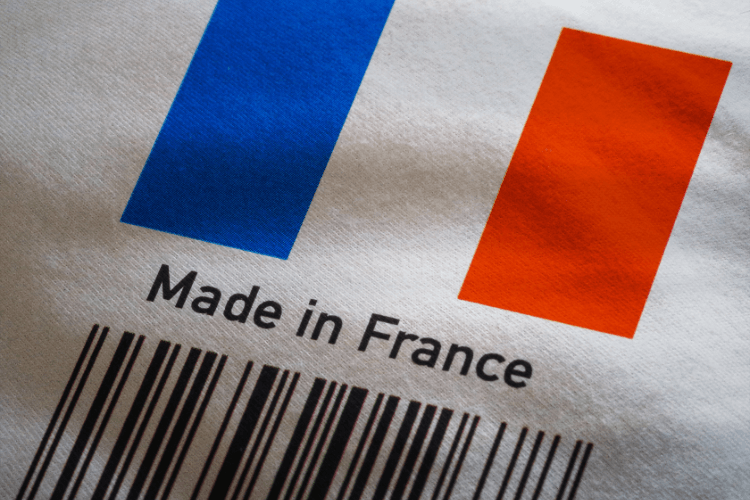THE PRICE OF MADE IN FRANCE
The Hédonist Labs team
The"Made in France" label represents much more than just a geographical label; it symbolizes a commitment to quality, know-how and a sustainable economy. However, the cost of this label is a hot topic, balancing the preservation of France's industrial heritage with the economic realities of more expensive local production.
Faced with the challenges of globalization, how can we economically justify the extra cost of "Made in France" products while remaining competitive on the international market?
HISTORY OF "MADE IN FRANCE" :
The origins of this movement can be traced back to the first reflections on the protection of national industry at the end of the 19th century. Faced with growing foreign competition, the French authorities began to promote the identification of products manufactured in France.
Over time, "Made in France" has evolved to become a true symbol of quality and national pride. In the 1960s and 1970s, it enjoyed a particular boom, driven by a desire to preserve traditional know-how and promote local products.
Several key moments have marked the history of this movement, notably the introduction of specific regulations designed to protect and promote products made in France. The creation of quality labels such as"Origine France Garantie" or"Entreprise du Patrimoine Vivant" has also helped to boost consumer confidence in French products.
Today,"Made in France" continues to enjoy growing popularity, driven by a demand for product transparency and traceability. It represents a real competitive lever for French companies, while embodying the values of excellence and tradition for which French industry is renowned.
THESE BENEFITS AND CHALLENGES:
The economic benefits of "Made in France" are manifold. Firstly, it helps support the national economy by creating local jobs and stimulating French industries. By encouraging consumption of products made in France, it also helps to reduce the country's trade deficit and strengthen its trade balance.
Theimpact on employment is significant, as maintaining and developing industrial activities in France helps to preserve skilled jobs and boost local employment. What's more, "Made in France" can boost the competitiveness of French companies on international markets by promoting French quality, innovation and know-how.
However, "Made in France" also faces significant challenges. Local production can entail higher manufacturing costs due to stringent social and environmental standards, as well as skilled labor. This can make some products less price-competitive on the world market.
On the other hand, local consumption can be hampered by the availability and diversity of products, as well as by consumer habits rooted in the systematic search for the best value for money. Raising consumer awareness of the importance of "Made in France", while supporting initiatives to facilitate access to local products, is therefore a major challenge in promoting this sector.
THE PRICE OF FRENCH PRODUCTION :
The price of "Made in France" products is influenced by several factors. Firstly, production costs can be higher due to the strict social and environmental standards to which French companies are subject. Skilled labor and higher wages in France also contribute to higher manufacturing costs.
Compared with products manufactured abroad, "Made in France" products can be more expensive due to these higher production costs. However, this price difference is often offset by better quality, greater durability and guaranteed traceability, which may justify a greater investment for some consumers.
Consumers' perception of price varies according to individuals and their priorities. Some are prepared to pay a higher price for products made in France because of their attachment to the values of quality, know-how and support for the local economy. Others, on the other hand, may be more price-sensitive and opt for cheaper products, even if they are made abroad.
It is therefore essential for French companies to strike a balance between quality, price and market competitiveness, while at the same time raising consumer awareness of the added value of "Made in France" products and their contribution to maintaining the country's economic and social fabric.
MADE IN FRANCE" COMPANIES' STRATEGIES FOR MANAGING COSTS :
- Production optimizationMade in France" companies are looking to optimize their production processes to cut costs while maintaining quality. This may involve automating repetitive tasks, improving the energy efficiency of equipment, or streamlining supply chains to reduce lead times and transport costs.
- Promoting quality and know-howRather than focusing solely on price competitiveness, "Made in France" companies emphasize the quality of their products and their artisanal or industrial know-how. They capitalize on the reputation of French excellence to justify sometimes higher prices, highlighting criteria such as durability, traceability of materials, or quality certifications.
- Specific marketing and communicationMade in France" companies adopt specific marketing and communication strategies to highlight their national origin and associated values. This can take the form of highlighting local traditions, partnerships with French artisans or designers, or awareness-raising campaigns on the importance of supporting the local economy. In this way, they target consumers who are sensitive to these arguments and willing to pay a premium for quality local products.
THE ROLE OF CONSUMERS IN PROMOTING IT:
- Raising awareness of the importance of "Made in FranceConsumers play a crucial role in promoting "Made in France" by being made aware of its economic, social and environmental importance. By understanding the stakes involved in preserving local know-how, creating jobs and reducing the ecological footprint linked to transport, consumers can be encouraged to give preference to products made in France when making their purchases.
- Responsible consumption and choosing local productsConsumers can actively contribute to the promotion of "Made in France" by adopting a responsible consumption approach. By favoring local products, they encourage French companies to maintain and develop their activities in France. This choice also reflects a desire to support the local economy, preserve jobs and promote more sustainable production practices.
- Influencing trade and government policiesConsumer purchasing behavior can also influence trade and government policies in favor of "Made in France". A growing demand for local products may prompt authorities to introduce measures to support domestic industries, such as tax incentives, subsidies or regulations favorable to local production. In addition, increased public awareness may lead to a demand for product transparency and traceability, prompting governments to tighten quality and environmental standards.
In short, consumers have significant power in promoting "Made in France" through their purchasing choices, their commitment to responsible consumption and their influence on trade and government policies.
FUTURE PROSPECTS FOR "MADE IN FRANCE":
- Emerging trends in production and consumptionEmerging trends in production and consumption, such as the search for local, sustainable and ethical products, offer growth opportunities for "Made in France". Consumers are increasingly aware of the impact of their purchases on the environment and society, leading them to favor locally manufactured, environmentally-friendly products.
- Technological innovation and sustainabilityTechnological innovations play a crucial role in the future of "Made in France". French companies can take advantage of advances in additive manufacturing, automation and digitization to boost their competitiveness and efficiency. At the same time, sustainability is becoming a major issue, encouraging companies to develop production practices that are more respectful of the environment and natural resources.
- Potential impact of globalization and trade policiesGlobalization and international trade policies will continue to have an impact on "Made in France". International competition remains fierce, and French companies will face challenges such as cost pressures, intellectual property protection and access to foreign markets. Trade policies and international agreements will also influence the export of French products and the ability of companies to position themselves on world markets.
In short, the future outlook for products made in France is promising, provided that French companies adapt to market trends, invest in innovation and sustainability, and seize the opportunities offered by the growing demand for local, quality products.
Made in France" is much more than a simple indication of origin. It's a label steeped in history, quality and know-how, embodying excellence and national identity. Over the decades, it has evolved to meet the economic, social and environmental challenges of our time.
Despite the challenges of production costs, international competition and changing trade policies, "Made in France" offers many opportunities for the French economy. By promoting innovation, quality and sustainability, French companies can respond to growing consumer demand for local and ethical products.
To ensure a sustainable and prosperous future for "Made in France", close collaboration between economic, political and social players is essential. Businesses, governments and civil society must work together to promote the values of "Made in France", support innovation and strengthen the competitiveness of national industry.
Together, we can build a "Made in France" that embodies best practices in quality, sustainability and social responsibility, while preserving the traditions and heritage that make our country so rich. With a shared vision and a common commitment, "Made in France" will continue to shine on the international stage, flying the flag for French excellence.




